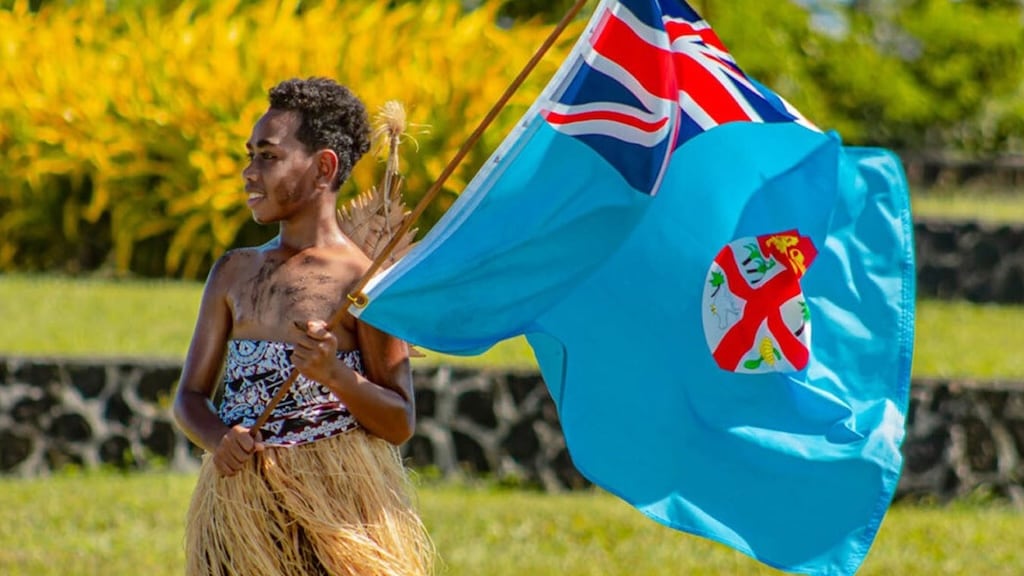Fiji Day
Fiji Day: Celebrating Independence and Unity in the Pacific 🇫🇯
Fiji Day, observed annually on October 10th, is the most significant national holiday in the Republic of Fiji. It commemorates two pivotal moments in the nation's history: the date in 1874 when King Seru Epenisa Cakobau ceded Fiji to the United Kingdom, and more importantly, the anniversary of Fiji's independence from British colonial rule in 1970. This dual commemoration highlights Fiji's journey from a traditional chieftainship to a British colony and finally to a sovereign nation, celebrating both its historical roots and its modern identity.

The week leading up to Fiji Day is known as "Fiji Week," a period of vibrant festivities that showcase the nation's rich cultural tapestry and foster a sense of national unity. It is a time when the diverse ethnic groups of Fiji—Indigenous Fijians, Indo-Fijians, Europeans, Chinese, and others—come together to celebrate their shared heritage and future. The celebrations are a colorful display of traditional ceremonies, religious observances, cultural performances, and community gatherings, all aimed at reinforcing the spirit of nationhood and pride in Fiji's unique identity as a multicultural Pacific island nation.
The Heart of the Celebration: Core Traditions
Fiji Day and Fiji Week are steeped in traditions that reflect the country's blend of indigenous customs, colonial influences, and multiculturalism. The celebrations typically begin with religious services across various denominations, offering prayers for the nation's prosperity and peace. These services often feature hymns sung in multiple languages, symbolizing the religious diversity of Fiji.
Throughout Fiji Week, cultural performances are a highlight. Indigenous Fijian meke (traditional dances and songs) tell stories of ancient legends and historical events, while Indo-Fijian communities showcase their vibrant music and dance forms. Sports competitions, particularly rugby, which is a national passion, are also a popular feature, bringing communities together in friendly rivalry.
On Fiji Day itself, official ceremonies are held, often attended by government dignitaries, military personnel, and the public. These typically include flag-raising ceremonies, speeches reflecting on the nation's history and future, and parades. The atmosphere is one of joyous celebration, with people dressed in traditional attire or the national colors of blue, white, and red. Feasting is an integral part of the celebrations, with families and communities sharing traditional Fijian dishes like lovo (food cooked in an earth oven), kokoda (marinated fish salad), and various curries, alongside modern culinary delights.
A Tour of Fiji's Fiji Day Celebrations
Fiji Day is celebrated across the entire archipelago, with major events in the capital city and significant community gatherings in towns and villages throughout the islands.
🇫🇯 Suva, Viti Levu
As the capital city, Suva is the focal point for the main official Fiji Day celebrations. The President of Fiji typically attends the grand ceremony at Albert Park, which includes a military parade, flag-raising, and speeches. Cultural performances from various ethnic groups are showcased, and the city comes alive with street parties, markets, and musical events. The waterfront is often a hub of activity, with boat races and other aquatic displays.
🇫🇯 Nadi, Viti Levu
Nadi, known as Fiji's tourism hub, also hosts significant Fiji Day celebrations. Local communities organize their own events, often centered around schools, churches, and community halls. Resorts may put on special cultural shows and feasts for their guests, allowing visitors to experience the national holiday. The blend of traditional Fijian and Indo-Fijian cultural displays is particularly prominent here.
🇫🇯 Lautoka, Viti Levu
Lautoka, Fiji's second-largest city and a major port, celebrates Fiji Day with a strong emphasis on community participation. Parades involving school children, community groups, and local organizations are common. Sporting events, particularly soccer and rugby tournaments, are popular, drawing large crowds. The city's multicultural population ensures a diverse range of food stalls and cultural performances.
🇫🇯 Savusavu, Vanua Levu
On the island of Vanua Levu, Savusavu offers a more laid-back yet equally enthusiastic celebration of Fiji Day. Local villages and towns organize their own events, often featuring traditional meke, kava ceremonies, and shared meals. The focus here is often on strengthening community bonds and preserving indigenous Fijian customs, providing a more intimate experience of the national holiday.
🇫🇯 Outer Islands
In the more remote outer islands, Fiji Day celebrations are often deeply rooted in traditional village life. Communities come together for church services, communal feasts, and cultural exchanges. These celebrations are characterized by strong family ties, shared responsibilities, and a deep connection to the land and sea, offering an authentic glimpse into Fijian island culture.
Conclusion
Fiji Day is more than just a public holiday; it is a vibrant affirmation of Fiji's independence, its rich cultural heritage, and the unity of its diverse people. It serves as a powerful reminder of the nation's journey and its aspirations for a peaceful and prosperous future.
Through its week-long festivities and solemn commemorations, Fiji Day reinforces the bonds that tie Fijians together, celebrating their unique identity as a proud Pacific nation. For more information on Fiji's culture and events, visit the official Tourism Fiji website.